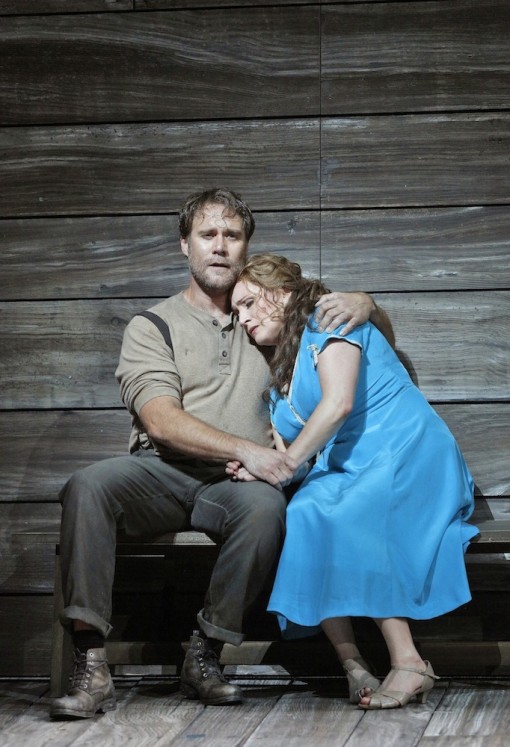Der Rosenkavalier, Glyndebourne
Richard Jones finds new order in Strauss and Hofmannsthal's rococo comedy for music
Sunday, 18 May 2014
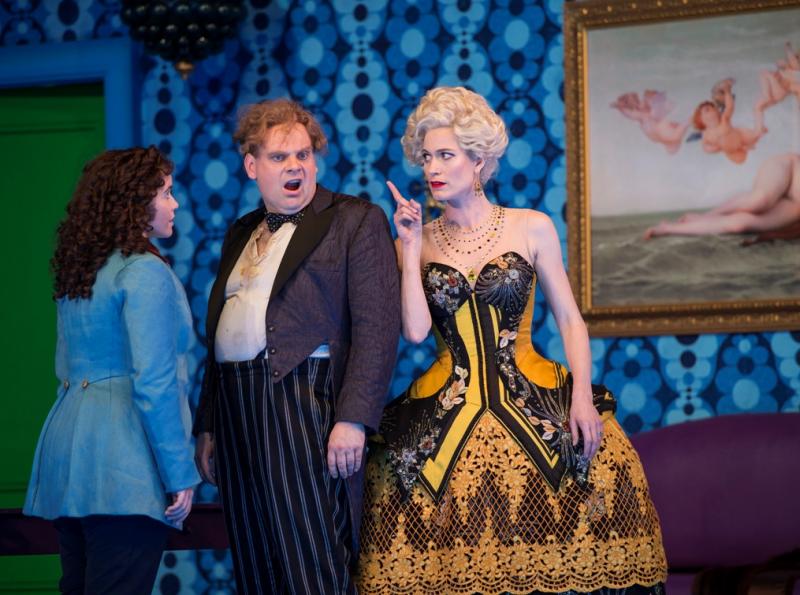 A Viennese masquerade: Tara Erraught as Octavian, Lars Woldt as Baron Ochs and Kate Royal as the MarschallinAll images by Bill Cooper
What spontaneous use might a silver rose take on after its formal presentation by a chubby cherub of a cavalier to a bartered bride-to-be? This and a thousand other score-co-ordinated details are things you never can predict in the hands of that chameleonic yet rigorous director Richard Jones. He throws out most of the meticulous stage directions in Hugo von Hofmannsthal’s rococo libretto for Richard Strauss and finds his own. You may not like them – I mostly did – but you can’t say that this isn’t quality work in tandem with a team of near-ideal Glyndebourne singers and beautifully if often unobtrusively paced conducting of the London Philharmonic Orchestra by Robin Ticciati.
Jones gets you thinking, as always, about the myriad implications of a musical fantasia composed in 1910, looking back to the 1740s and perfectly capable of taking on 1930s film references (Marlene Dietrich as Catherine the Great is one of many striking templates). Much of the strictly choreographed action, with input from Sarah Fahie and performers in straight lines downstage, is counterintuitive to the naturalism Hofmannsthal had in mind, but it works if you let it.The re-imaginings are sometimes dark, always done with the light touch recommended by the opera’s principal character, the 30-something Marschallin with her consciousness of passing time. (Pictured below, Kate Royal's Marschallin with Tara Erraught as Octavian playing maid Mariandel.)
A Viennese masquerade: Tara Erraught as Octavian, Lars Woldt as Baron Ochs and Kate Royal as the MarschallinAll images by Bill Cooper
What spontaneous use might a silver rose take on after its formal presentation by a chubby cherub of a cavalier to a bartered bride-to-be? This and a thousand other score-co-ordinated details are things you never can predict in the hands of that chameleonic yet rigorous director Richard Jones. He throws out most of the meticulous stage directions in Hugo von Hofmannsthal’s rococo libretto for Richard Strauss and finds his own. You may not like them – I mostly did – but you can’t say that this isn’t quality work in tandem with a team of near-ideal Glyndebourne singers and beautifully if often unobtrusively paced conducting of the London Philharmonic Orchestra by Robin Ticciati.
Jones gets you thinking, as always, about the myriad implications of a musical fantasia composed in 1910, looking back to the 1740s and perfectly capable of taking on 1930s film references (Marlene Dietrich as Catherine the Great is one of many striking templates). Much of the strictly choreographed action, with input from Sarah Fahie and performers in straight lines downstage, is counterintuitive to the naturalism Hofmannsthal had in mind, but it works if you let it.The re-imaginings are sometimes dark, always done with the light touch recommended by the opera’s principal character, the 30-something Marschallin with her consciousness of passing time. (Pictured below, Kate Royal's Marschallin with Tara Erraught as Octavian playing maid Mariandel.)
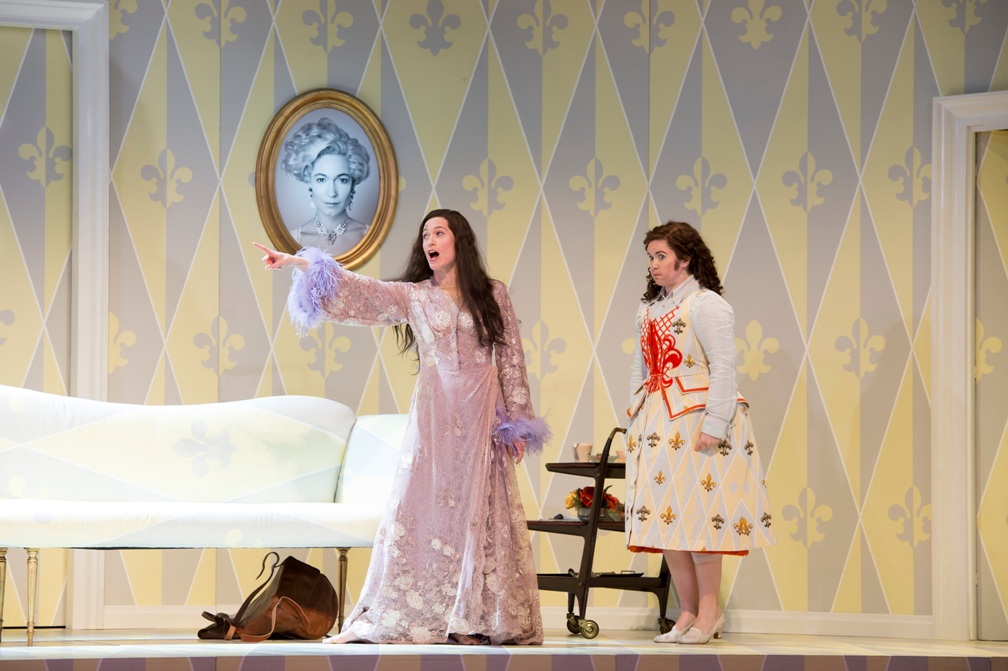 Let’s start with the stage coup that sets up her soliloquy on that theme, extracting a general meditation on instability from the prospect of a middle-aged man marrying a young girl for money and her own situation as the lover of a teenage boy. She’s not alone; a bald, bespectacled, bearded gentleman with a notebook materializes at the back of the room. The minute she lies down on the long couch, we get the reference. There are ripples of knowing mirth in the audience, but only for a few seconds while the chamber orchestra sets up its “once upon a time” framework. As Kate Royal, unpredictably poised and diamantine as the opera's heart and soul once the fluttery vibrato settles, launches into her meditation on how this young girl doomed to a churlish older man is just like her younger self, we listen. You can hear a pin drop in the silences Ticciati judges so well, and time stands still with her monologue on stopping all the clocks, as it has the minute she’s observed that her hairdresser has “made an old woman” out of her.
What women are made of by men is a crucial theme of the opera, even if Strauss and Hofmannsthal’s pre-feminist stance never allows the social straitjacket to be loosened. The Marschallin first appears stark naked under a shower, Venus Anodyomine – the first surprise, no bed onstage for the sex scene of the orchestral prelude, where the only rumpled sheets on the first night were in the orchestra, soon smoothed as Ticciati got the players under flexible control. Our gracious lady’s styles are dictated by an accordion-card of fashion plates, deliciously mirrored (all is symmetry in a Jones production) by the semi-clad girlie pictures unfolded by Baron Ochs’s lunkish retinue to the climax of the famous Act Two waltz. Sophie, the horse at a dealers’ fair, is made to stand on a table while bids are placed; did the Marschallin realize that sending her own lover was the girl’s only chance of escape?
Let’s start with the stage coup that sets up her soliloquy on that theme, extracting a general meditation on instability from the prospect of a middle-aged man marrying a young girl for money and her own situation as the lover of a teenage boy. She’s not alone; a bald, bespectacled, bearded gentleman with a notebook materializes at the back of the room. The minute she lies down on the long couch, we get the reference. There are ripples of knowing mirth in the audience, but only for a few seconds while the chamber orchestra sets up its “once upon a time” framework. As Kate Royal, unpredictably poised and diamantine as the opera's heart and soul once the fluttery vibrato settles, launches into her meditation on how this young girl doomed to a churlish older man is just like her younger self, we listen. You can hear a pin drop in the silences Ticciati judges so well, and time stands still with her monologue on stopping all the clocks, as it has the minute she’s observed that her hairdresser has “made an old woman” out of her.
What women are made of by men is a crucial theme of the opera, even if Strauss and Hofmannsthal’s pre-feminist stance never allows the social straitjacket to be loosened. The Marschallin first appears stark naked under a shower, Venus Anodyomine – the first surprise, no bed onstage for the sex scene of the orchestral prelude, where the only rumpled sheets on the first night were in the orchestra, soon smoothed as Ticciati got the players under flexible control. Our gracious lady’s styles are dictated by an accordion-card of fashion plates, deliciously mirrored (all is symmetry in a Jones production) by the semi-clad girlie pictures unfolded by Baron Ochs’s lunkish retinue to the climax of the famous Act Two waltz. Sophie, the horse at a dealers’ fair, is made to stand on a table while bids are placed; did the Marschallin realize that sending her own lover was the girl’s only chance of escape?
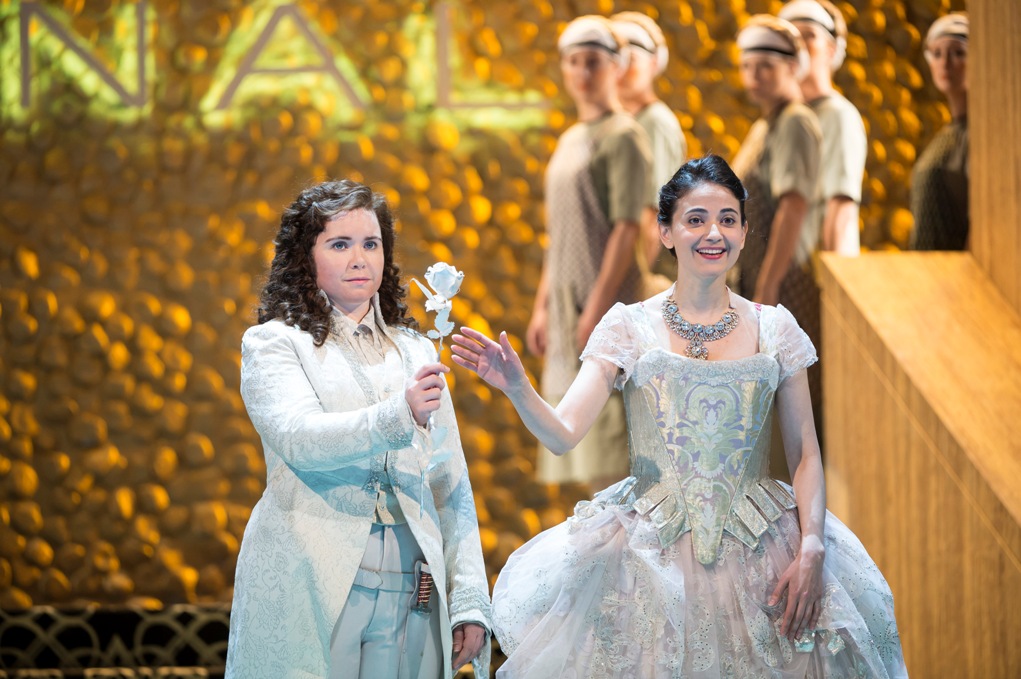 There are no boring bits, which may delight the many folk who dread the Act Three masquerade in a louche tavern. Jones is the master of making sticky operatic moments work, as his party scene for Tchaikovsky’s Queen of Spades spookily proved. This is inspired, too, and it made me cry with laughter. Mimi Jordan Sherin’s lighting, the Dayglo designs of Paul Steinberg, and Nicky Gillibrand's hybrid costumes do their genius work setting up the Baron’s discomfiture as the hired helps do weird routines and a noose drops from the triangular ceiling. There are three doors, too – all we need to set up a climactic trio which Jones leaves well alone, other than a sudden look from the older woman to the younger. After it, Sophie goes to follow the Marschallin as if magnetized, then Octavian does the same. The most wrenching moment in the final scene belongs not to the renunciatory Marschallin but to Sophie, as she crumples in despair at the thought that her new love has just walked out of the door for good.
Do we believe in Tara Erraught’s naughty, dimpled little Cupid as the 17-year-old lover of the experienced Marschallin? Not really, though that may be part of the intended weirdness, and her vocal ardour, if often pressed to sharpness, is informed by meaningful physical gestures at each point (everyone knows how to lead, and be led by, their hands). What a funny, lovable mug, too. She/he is utterly convincing when lovestruck at first sight by a spirited virgin in Act Two (pictured above with Teodora Gheorghiu's Sophie). The scenes between the rosebearer and his circumscribed object of desire (Gheorghiu, perfectly spirited if vocally a little pale at times) are among the best, beautifully detailed as their second duet gives way to the apprehension by intriguers Valzacchi (Christopher Gillett) and Annina (Helene Schneiderman, wonderfully weird in the letter scene and when she apes a discarded peasant “wife”).
There are no boring bits, which may delight the many folk who dread the Act Three masquerade in a louche tavern. Jones is the master of making sticky operatic moments work, as his party scene for Tchaikovsky’s Queen of Spades spookily proved. This is inspired, too, and it made me cry with laughter. Mimi Jordan Sherin’s lighting, the Dayglo designs of Paul Steinberg, and Nicky Gillibrand's hybrid costumes do their genius work setting up the Baron’s discomfiture as the hired helps do weird routines and a noose drops from the triangular ceiling. There are three doors, too – all we need to set up a climactic trio which Jones leaves well alone, other than a sudden look from the older woman to the younger. After it, Sophie goes to follow the Marschallin as if magnetized, then Octavian does the same. The most wrenching moment in the final scene belongs not to the renunciatory Marschallin but to Sophie, as she crumples in despair at the thought that her new love has just walked out of the door for good.
Do we believe in Tara Erraught’s naughty, dimpled little Cupid as the 17-year-old lover of the experienced Marschallin? Not really, though that may be part of the intended weirdness, and her vocal ardour, if often pressed to sharpness, is informed by meaningful physical gestures at each point (everyone knows how to lead, and be led by, their hands). What a funny, lovable mug, too. She/he is utterly convincing when lovestruck at first sight by a spirited virgin in Act Two (pictured above with Teodora Gheorghiu's Sophie). The scenes between the rosebearer and his circumscribed object of desire (Gheorghiu, perfectly spirited if vocally a little pale at times) are among the best, beautifully detailed as their second duet gives way to the apprehension by intriguers Valzacchi (Christopher Gillett) and Annina (Helene Schneiderman, wonderfully weird in the letter scene and when she apes a discarded peasant “wife”).
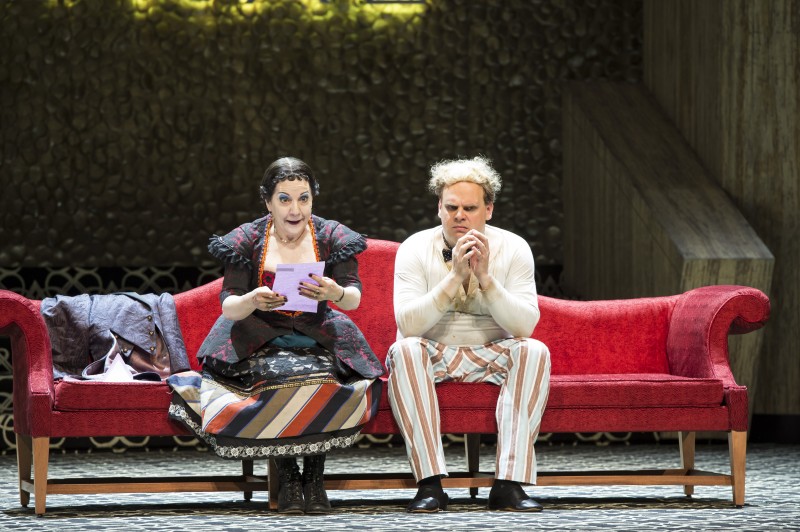 Lars Woldt’s Ochs is riveting and original: not repulsive, as he too often can be, but genuinely funny, uncouth and Bunterish in his Austrian country wear. We begin to sympathise as, bum-sore and humiliated, he takes up a position on the couch in nouveau-riche Faninal’s proto-fascistic hallway as self-protective as the Marschallin’s in the previous act – though a glass of wine or three stop him resorting to her foetal position (Woldt pictured above with Helene Schneiderman's Annina). Vocally, it’s a nuanced performance – and the first time I’ve heard “heu”, in the phrase “you must have a haystack in the vicinity”, sung on a high note piano as Strauss asks. Very well, no bottom C in Act One, but you can't have quite everything.
Lars Woldt’s Ochs is riveting and original: not repulsive, as he too often can be, but genuinely funny, uncouth and Bunterish in his Austrian country wear. We begin to sympathise as, bum-sore and humiliated, he takes up a position on the couch in nouveau-riche Faninal’s proto-fascistic hallway as self-protective as the Marschallin’s in the previous act – though a glass of wine or three stop him resorting to her foetal position (Woldt pictured above with Helene Schneiderman's Annina). Vocally, it’s a nuanced performance – and the first time I’ve heard “heu”, in the phrase “you must have a haystack in the vicinity”, sung on a high note piano as Strauss asks. Very well, no bottom C in Act One, but you can't have quite everything.
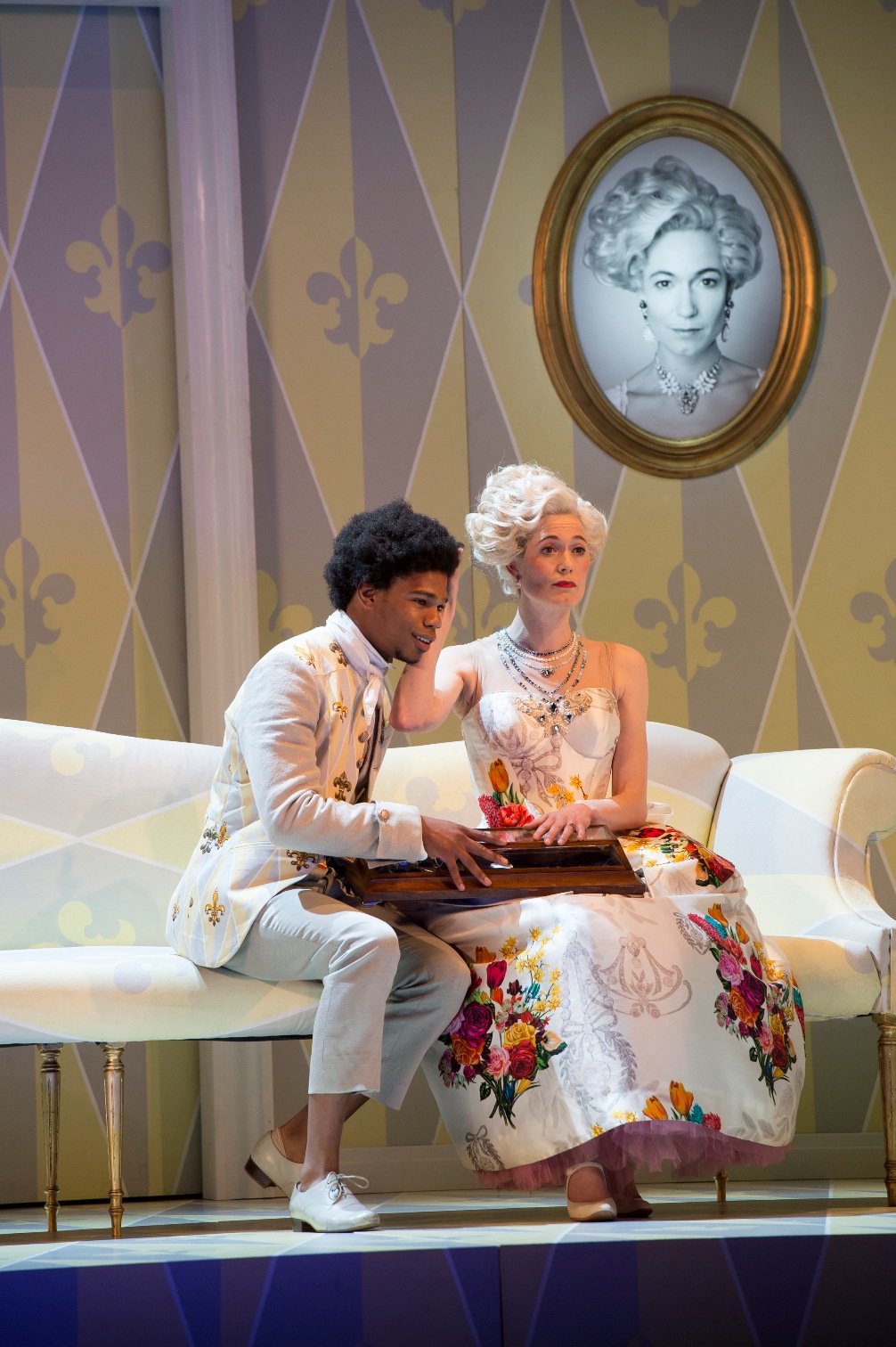 This is the biggest voice on stage, but the others don’t have to battle since Ticciati keeps the glinting, jewel-studded orchestra down as a magic carpet, stupendous in the velvety conspiratorial tarantella that launches Act 3, and vitally rosy for the last 20 minutes. The singing may be variable but the performances aren’t: everyone is there to serve Jones’s off-kilter and unyielding slice of story-telling, down to Miranda Keys’ opulent-sounding, red-wigged duenna, Alun Rhys-Jenkins as Faninal’s insistently sinister Major-Domo and the non-singing charactacterisations of Joseph Bader as Ochs’s tall, goofy bastard son, bemused but ultimately dazzled as we all are by Andrej Dunaev’s Italian Tenor and of Daniel Francis-Swaby as a winningly Marschallin-struck adolescent Mohammed (pictured above with Royal's Marschallin).
So out with every drop of tired old business, in with the new order. In an utterly natural and admirable speech before the Prelude, Glyndebourne chatelain Gus Christie told us how his dear, recently departed old dad George might have had something to say about certain aspects, but would have gone with it. Go with it, too, and you’ll be tickled as well as touched and amazed.
This is the biggest voice on stage, but the others don’t have to battle since Ticciati keeps the glinting, jewel-studded orchestra down as a magic carpet, stupendous in the velvety conspiratorial tarantella that launches Act 3, and vitally rosy for the last 20 minutes. The singing may be variable but the performances aren’t: everyone is there to serve Jones’s off-kilter and unyielding slice of story-telling, down to Miranda Keys’ opulent-sounding, red-wigged duenna, Alun Rhys-Jenkins as Faninal’s insistently sinister Major-Domo and the non-singing charactacterisations of Joseph Bader as Ochs’s tall, goofy bastard son, bemused but ultimately dazzled as we all are by Andrej Dunaev’s Italian Tenor and of Daniel Francis-Swaby as a winningly Marschallin-struck adolescent Mohammed (pictured above with Royal's Marschallin).
So out with every drop of tired old business, in with the new order. In an utterly natural and admirable speech before the Prelude, Glyndebourne chatelain Gus Christie told us how his dear, recently departed old dad George might have had something to say about certain aspects, but would have gone with it. Go with it, too, and you’ll be tickled as well as touched and amazed.
Der Rosenkavalier review – bursting with life, energy and wit

A Viennese masquerade: Tara Erraught as Octavian, Lars Woldt as Baron Ochs and Kate Royal as the MarschallinAll images by Bill Cooper
What spontaneous use might a silver rose take on after its formal presentation by a chubby cherub of a cavalier to a bartered bride-to-be? This and a thousand other score-co-ordinated details are things you never can predict in the hands of that chameleonic yet rigorous director Richard Jones. He throws out most of the meticulous stage directions in Hugo von Hofmannsthal’s rococo libretto for Richard Strauss and finds his own. You may not like them – I mostly did – but you can’t say that this isn’t quality work in tandem with a team of near-ideal Glyndebourne singers and beautifully if often unobtrusively paced conducting of the London Philharmonic Orchestra by Robin Ticciati.
Jones gets you thinking, as always, about the myriad implications of a musical fantasia composed in 1910, looking back to the 1740s and perfectly capable of taking on 1930s film references (Marlene Dietrich as Catherine the Great is one of many striking templates). Much of the strictly choreographed action, with input from Sarah Fahie and performers in straight lines downstage, is counterintuitive to the naturalism Hofmannsthal had in mind, but it works if you let it.The re-imaginings are sometimes dark, always done with the light touch recommended by the opera’s principal character, the 30-something Marschallin with her consciousness of passing time. (Pictured below, Kate Royal's Marschallin with Tara Erraught as Octavian playing maid Mariandel.)
 Let’s start with the stage coup that sets up her soliloquy on that theme, extracting a general meditation on instability from the prospect of a middle-aged man marrying a young girl for money and her own situation as the lover of a teenage boy. She’s not alone; a bald, bespectacled, bearded gentleman with a notebook materializes at the back of the room. The minute she lies down on the long couch, we get the reference. There are ripples of knowing mirth in the audience, but only for a few seconds while the chamber orchestra sets up its “once upon a time” framework. As Kate Royal, unpredictably poised and diamantine as the opera's heart and soul once the fluttery vibrato settles, launches into her meditation on how this young girl doomed to a churlish older man is just like her younger self, we listen. You can hear a pin drop in the silences Ticciati judges so well, and time stands still with her monologue on stopping all the clocks, as it has the minute she’s observed that her hairdresser has “made an old woman” out of her.
Let’s start with the stage coup that sets up her soliloquy on that theme, extracting a general meditation on instability from the prospect of a middle-aged man marrying a young girl for money and her own situation as the lover of a teenage boy. She’s not alone; a bald, bespectacled, bearded gentleman with a notebook materializes at the back of the room. The minute she lies down on the long couch, we get the reference. There are ripples of knowing mirth in the audience, but only for a few seconds while the chamber orchestra sets up its “once upon a time” framework. As Kate Royal, unpredictably poised and diamantine as the opera's heart and soul once the fluttery vibrato settles, launches into her meditation on how this young girl doomed to a churlish older man is just like her younger self, we listen. You can hear a pin drop in the silences Ticciati judges so well, and time stands still with her monologue on stopping all the clocks, as it has the minute she’s observed that her hairdresser has “made an old woman” out of her.
What women are made of by men is a crucial theme of the opera, even if Strauss and Hofmannsthal’s pre-feminist stance never allows the social straitjacket to be loosened. The Marschallin first appears stark naked under a shower, Venus Anodyomine – the first surprise, no bed onstage for the sex scene of the orchestral prelude, where the only rumpled sheets on the first night were in the orchestra, soon smoothed as Ticciati got the players under flexible control. Our gracious lady’s styles are dictated by an accordion-card of fashion plates, deliciously mirrored (all is symmetry in a Jones production) by the semi-clad girlie pictures unfolded by Baron Ochs’s lunkish retinue to the climax of the famous Act Two waltz. Sophie, the horse at a dealers’ fair, is made to stand on a table while bids are placed; did the Marschallin realize that sending her own lover was the girl’s only chance of escape?
 There are no boring bits, which may delight the many folk who dread the Act Three masquerade in a louche tavern. Jones is the master of making sticky operatic moments work, as his party scene for Tchaikovsky’s Queen of Spades spookily proved. This is inspired, too, and it made me cry with laughter. Mimi Jordan Sherin’s lighting, the Dayglo designs of Paul Steinberg, and Nicky Gillibrand's hybrid costumes do their genius work setting up the Baron’s discomfiture as the hired helps do weird routines and a noose drops from the triangular ceiling. There are three doors, too – all we need to set up a climactic trio which Jones leaves well alone, other than a sudden look from the older woman to the younger. After it, Sophie goes to follow the Marschallin as if magnetized, then Octavian does the same. The most wrenching moment in the final scene belongs not to the renunciatory Marschallin but to Sophie, as she crumples in despair at the thought that her new love has just walked out of the door for good.
There are no boring bits, which may delight the many folk who dread the Act Three masquerade in a louche tavern. Jones is the master of making sticky operatic moments work, as his party scene for Tchaikovsky’s Queen of Spades spookily proved. This is inspired, too, and it made me cry with laughter. Mimi Jordan Sherin’s lighting, the Dayglo designs of Paul Steinberg, and Nicky Gillibrand's hybrid costumes do their genius work setting up the Baron’s discomfiture as the hired helps do weird routines and a noose drops from the triangular ceiling. There are three doors, too – all we need to set up a climactic trio which Jones leaves well alone, other than a sudden look from the older woman to the younger. After it, Sophie goes to follow the Marschallin as if magnetized, then Octavian does the same. The most wrenching moment in the final scene belongs not to the renunciatory Marschallin but to Sophie, as she crumples in despair at the thought that her new love has just walked out of the door for good.
Do we believe in Tara Erraught’s naughty, dimpled little Cupid as the 17-year-old lover of the experienced Marschallin? Not really, though that may be part of the intended weirdness, and her vocal ardour, if often pressed to sharpness, is informed by meaningful physical gestures at each point (everyone knows how to lead, and be led by, their hands). What a funny, lovable mug, too. She/he is utterly convincing when lovestruck at first sight by a spirited virgin in Act Two (pictured above with Teodora Gheorghiu's Sophie). The scenes between the rosebearer and his circumscribed object of desire (Gheorghiu, perfectly spirited if vocally a little pale at times) are among the best, beautifully detailed as their second duet gives way to the apprehension by intriguers Valzacchi (Christopher Gillett) and Annina (Helene Schneiderman, wonderfully weird in the letter scene and when she apes a discarded peasant “wife”).
 Lars Woldt’s Ochs is riveting and original: not repulsive, as he too often can be, but genuinely funny, uncouth and Bunterish in his Austrian country wear. We begin to sympathise as, bum-sore and humiliated, he takes up a position on the couch in nouveau-riche Faninal’s proto-fascistic hallway as self-protective as the Marschallin’s in the previous act – though a glass of wine or three stop him resorting to her foetal position (Woldt pictured above with Helene Schneiderman's Annina). Vocally, it’s a nuanced performance – and the first time I’ve heard “heu”, in the phrase “you must have a haystack in the vicinity”, sung on a high note piano as Strauss asks. Very well, no bottom C in Act One, but you can't have quite everything.
Lars Woldt’s Ochs is riveting and original: not repulsive, as he too often can be, but genuinely funny, uncouth and Bunterish in his Austrian country wear. We begin to sympathise as, bum-sore and humiliated, he takes up a position on the couch in nouveau-riche Faninal’s proto-fascistic hallway as self-protective as the Marschallin’s in the previous act – though a glass of wine or three stop him resorting to her foetal position (Woldt pictured above with Helene Schneiderman's Annina). Vocally, it’s a nuanced performance – and the first time I’ve heard “heu”, in the phrase “you must have a haystack in the vicinity”, sung on a high note piano as Strauss asks. Very well, no bottom C in Act One, but you can't have quite everything. This is the biggest voice on stage, but the others don’t have to battle since Ticciati keeps the glinting, jewel-studded orchestra down as a magic carpet, stupendous in the velvety conspiratorial tarantella that launches Act 3, and vitally rosy for the last 20 minutes. The singing may be variable but the performances aren’t: everyone is there to serve Jones’s off-kilter and unyielding slice of story-telling, down to Miranda Keys’ opulent-sounding, red-wigged duenna, Alun Rhys-Jenkins as Faninal’s insistently sinister Major-Domo and the non-singing charactacterisations of Joseph Bader as Ochs’s tall, goofy bastard son, bemused but ultimately dazzled as we all are by Andrej Dunaev’s Italian Tenor and of Daniel Francis-Swaby as a winningly Marschallin-struck adolescent Mohammed (pictured above with Royal's Marschallin).
This is the biggest voice on stage, but the others don’t have to battle since Ticciati keeps the glinting, jewel-studded orchestra down as a magic carpet, stupendous in the velvety conspiratorial tarantella that launches Act 3, and vitally rosy for the last 20 minutes. The singing may be variable but the performances aren’t: everyone is there to serve Jones’s off-kilter and unyielding slice of story-telling, down to Miranda Keys’ opulent-sounding, red-wigged duenna, Alun Rhys-Jenkins as Faninal’s insistently sinister Major-Domo and the non-singing charactacterisations of Joseph Bader as Ochs’s tall, goofy bastard son, bemused but ultimately dazzled as we all are by Andrej Dunaev’s Italian Tenor and of Daniel Francis-Swaby as a winningly Marschallin-struck adolescent Mohammed (pictured above with Royal's Marschallin).
So out with every drop of tired old business, in with the new order. In an utterly natural and admirable speech before the Prelude, Glyndebourne chatelain Gus Christie told us how his dear, recently departed old dad George might have had something to say about certain aspects, but would have gone with it. Go with it, too, and you’ll be tickled as well as touched and amazed.
Glyndebourne, Sussex
Forget the rumpus over Tara Erraught's curves in this 'trouser role' – her wonderful performance was all that mattered
Forget the rumpus over Tara Erraught's curves in this 'trouser role' – her wonderful performance was all that mattered
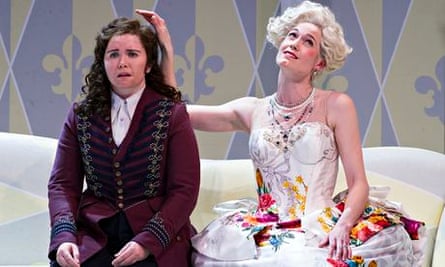

Glyndebourne's opening night, always an excitable occasion, was almost too burdened with circumstance and emotion: a sunlit anniversary, a death, a new arrival and a new production. No one knew that another drama was in the offing, of which more in due course. Gus Christie came on stage to dedicate the 80th festival to his father, George, who died a fortnight ago. George's imagination and hard work over nearly four decades at the helm led to a spectacular new theatre and the advent of a more accessible and unstuffy modern Glyndebourne. The Sussex festival remains elitist, if that means top quality, but its doors are no longer padlocked to all but the well-heeled or well-connected. Try for yourself.
The newcomer was Robin Ticciati, 31, who has succeeded Vladimir Jurowski as music director. The new staging was Richard Jones's 1950s updating of Der Rosenkavalier. The question of how the intellectually barbed Jones would handle Richard Strauss's clotted rococo-romantic confection, written in 1910 but holding up a mirror to a Mozartian past, merely added to the febrile atmosphere.
All of which is a preamble to explain why the orchestral prelude went awry. I feared it was going to stop altogether. Strauss's score in these first bars is explosive: a yelping, whooping, sexually charged opening to remind us that the young Octavian has been honing his life skills in bed with an older married woman, the Marschallin, who must be all of 28. No one in the pit sounded quite ready. Imagine a kick serve landing while the opponent is still picking up the racket, for which read music, bow, instrument, glasses, tempo.
The first-class London Philharmonic, one or two skirmishes aside, soon achieved equilibrium. In Ticciati's interpretation, clarity and detail stood out over shape and trajectory, the orchestral tone never too fat or congested yet perhaps needing more aural glow. A typically dazzling Strauss invention is the hushed, fluttering grouping of celesta, harps, flutes and violins in the presentation of the rose scene, magically played here. Ticciati brought out the work's darkness, too, with its echoes of the composer's Elektra and Salome in the weird, growling low wind and fidgety brass.
Jones, together with his designers Paul Steinberg (set), Nicky Gillibrand (costume) and Mimi Jordan Sherin (lighting), has created a stylish, half-crazed hybrid: Wiener Werkstätte and art deco wallpapers, powdered wigs and pannier skirts stopping mid-calf, modernist Mies van der Rohe chair and conservative French salon painting (Alexandre Cabanel's Birth of Venus), whipped up with a touch of nicely acidulated filmic glamour.
It looked magnificent and witty, without hitting us with "concept", always a relief. The best addition was the toning down of Baron Ochs (Lars Woldt), who was younger and more rugger-bugger than tweedy old boor – and the more credible for it. Woldt, a native German speaker, had adopted a rough dialect, just as Hofmannsthal and Strauss wanted. The scene in which he is duped, usually so tedious, had tension and humour.
The large and energetic cast was bursting with lively cameos from the major domo flunky with the snivelling smile, to everyone's favourite tongue-twisting gossips, Annina and Valzacchi (Helene Schneiderman and Christopher Gillett). Michael Kraus, Miranda Keys, Gwynne Howell and Andrej Dunaev all made the most of their supporting roles. As ever with Jones, there were funny-walking, crisply choreographed extras, who added their own dimension to the class-riven tale, though who could say who they all were.
The three women who stamp their indelible mark on this music, culminating in a final trio which is one of those Desert Island Discs favourite choices, were at once contrasting and well matched. Kate Royal as the Marschallin is first seen not in bed with Octavian, but post-bed near-naked in the shower, alla Venus. Royal is restrained rather than voluptuous in the role, but she is poised, accurate and always a rewarding performer.
Both Teodora Gheorghiu (Sophie) and the 27-year old Irish star mezzo Tara Erraught (Octavian) had a blissful innocence about them, as fresh in appearance and voice as babes in the wood. Gheorghiu has a quick, brittle, naughty demeanour reminiscent of the young Natalie Dessay. Erraught was touching in the trouser role of young Octavian, every moment beautifully sung and acted, ardent and appealing. Her voice is rich with dark glints and bright promise and she offered some of the best singing of the evening.
Unwittingly she provoked a storm of comment which might have been avoided by the simple matter of a nicer wig and costume. The question of body mass index seemed to take undue prominence. She is petite and not remotely androgynous. I was untroubled by her casting and enjoyed her interpretation, but some commentators seemed to hope that a girl dressed as a boy should actually look like a boy dressed as a boy. The row escalated out of all proportion but put the whole question of how critics, male or female, talk about performers, male or female under scrutiny. We should all be vigilant.
Perhaps Strauss would have cast the role for a tenor if having to look authentic in trousers were the prime requirement. He probably hoped, instead, it would be sung wonderfully. Seeing a woman's curves through the boxy frock-coat and breeches the role requires, here with a skim of boot-polish on the chin to suggest downy growth, only adds to the sexual ambiguity of this most erotically complex of operas.
*************************************************************************
REVIEW: DER ROSENKAVALIER (GLYNDEBOURNE OPERA)
by Howard Shepherdson on May 24, 2014
Richard Jones’ well-cast take on Richard Strauss has masterly touches galore.
Glyndebourne, UK
May 24, 2014
May 24, 2014
Following the opening night reviews earlier in the week there is a sense of life imitating art. In Act Two of Der Rosenkavalier, Baron Ochs appraises the physical potential of Sophie his bride-to-be and she declares it feels like being at a horse auction. Much has been said about the way some male critics felt entitled to comment on the physical shape of Irish mezzo-soprano Tara Erraught, and for me they behaved no better than the Baron himself.
If there was an audience prize that could be awarded at Glyndebourne then last night it went to Erraught. Appreciation for her performance was overwhelming and this was richly deserved. In his published response to the backlash against the critics’ comments, Guy Dammann, Chair of the Critics’ Circle’s Music Section, said that critics were not dispensing misogyny, just defending the life enhancing beauty of the art form. Maybe he should have asked the Glyndebourne audience who clearly disagreed with him.
A Richard Jones production will frequently challenge audience expectations. He loves making visual jokes on stage but they are always for a purpose: to confirm the intellectual and emotional heart of the opera. When at his best he is a wonderful storyteller and like an expert conductor can provide new insights to a familiar opera. At his worst, such as the over use of conga line choruses, you begin to feel he has nothing new to say. However, there were some clever moments in this production such as substituting the bedroom scene in Act One with the Marschallin showering Aphrodite-like in a shell bath and an adolescent Octavian ogling her beauty. Her confessional monologue in Act One paid homage to the Vienna of Freud and psychoanalysis. Here was a woman in the privileged ranks of a changing society, her life defined by aristocratic status, yet longing for eternal youth and sexual emancipation. There was also a hint of things to come when we realise through a simple caress that her teenage pageboy Mohammed could step into Octavian’s shoes as her next lover. It was with these directorial touches that Jones breaks free of traditional interpretation and highlights the human core of the opera.
As a director he also favours a visual quirkiness and is ably supported by the set designs of Paul Steinberg and costumes by Nicky Gillibrand. I sometimes found the stage action restricted by Steinberg’s angular walls which created shallow performing spaces. However, in Act Two a corporate reception hall dedicated to the Faninal family business revealed the aspirations of the upwardly mobile classes with its art deco splendour. The visual impact of the garish wallpaper in Act Three was fine for the burlesque comedy at the start of the act but clashed with the sentiments of the final moving trio. This may have been deliberate, but for me it simply got in the way.
Glyndebourne’s new music director Robin Ticciati demonstrated what an inspired choice his appointment was. After some alleged first night hiccups what we heard was assured conducting in sympathy with his singers and a richness of tone from every part of the orchestra. The main female voices were a pleasure to listen to and along with the orchestral playing were the main musical strengths of the evening. Tara Erraught gave an energetic comic performance when disguised as a maid and as Octavian excelled with confident and beautiful singing capturing every nuance of the score. Kate Roval’s Marschallin was magnificent. A quiet stillness and the depth of emotion to her voice contributed to a remarkable stage presence and musical impact. It was also pleasing to listen to Teodora Gheorghiu’s Sophie who captivated the audience right from the start. She handled the growing maturity of her character with impressive musical skill. She is a singer to watch.
The Baron Ochs of Lars Woldt encompassed the broad comedy of character, but also managed a more nuanced performance. He may have lacked the rich bass tones we normally expect with this role, but his more subtle performance came over as well rounded and believable. He was perfect for this production.
As a director Jones has a reputation for working hard with singers in minor roles (as does Glyndebourne as a company) and this certainly showed with some real gems in the cast. Worthy of mention was the assured performance by Michael Kraus as Herr von Faninal and Australian soprano Miranda Keys as Marianne Leitmetzerin. Keys is a good comic actor with perfect timing, but she is also understudying the part of the Marschallin and I would love to see her in that role at some time in the future. She has a beautifully expressive voice with a fine tone and is hopefully set for bigger roles in major houses.
This 80th season of opera at Glyndebourne was dedicated to George Christie who died recently this year. His willingness to allow directors to try new approaches avoided Glyndebourne becoming an opera museum and made productions such as this Rosenkavalier possible. Perhaps his generosity of spirit informs opera better than the small mindedness of some of the critics.

Broad comedy eclipses the emotional heart of Glyndebourne’s Prom Rosenkavalier
Glyndebourne’s annual away day from Lewes to the heaving metropolis is always a highlight of the Proms season, but this year’s visit was more hotly anticipated than usual. Its production of Der Rosenkavalier attracted vociferous media attention – mostly for the wrong reasons and by people who hadn’t actually seen it. I was keen to see how Richard Jones’ typically perverse production transferred to the Royal Albert Hall. Jones wasn’t on hand himself, so Sarah Fahie directed this semi-staging, which also saw two key cast changes enforced by illness, staying faithful to its concept and spirit.
As a description, ‘semi-staging’ doesn’t really do justice to what Glyndebourne presented. This was a fully costumed performance on a raised platform above the London Philharmonic Orchestra, with much of the production’s décor and props in situ. We weren’t spared Jones’ trademark lurid flock wallpaper designs, thanks to the garish LED panels at the back of the stage; if only these had been employed to display the surtitles instead. Entrances, exits and swift costume changes for Octavian/ Mariandel were effectively managed.
I’m not convinced that Jones actually likes this opera. The comedy is played very broadly – and often hits the mark – especially the bawdy humour of the tavern scene, which can seem interminable in some productions. Ochs receives the slightest of flesh wounds from Octavian in Act II courtesy of the silver rose being plunged into his posterior. But Rosenkavalier has to be about the conflicted emotions of Octavian, caught between the Marschallin and Sophie. Jones, by indicating in Act I that the Marschallin is clearly bored with her young lover and is ready to move on (to the pageboy, Mohammed), drains the final scene of much emotional investment. Jones’ stage pictures can be in conflict with what Strauss’ music is telling us, making it difficult to believe in the characters. There were two exceptions: when an emotionally fragile Marschallin reflects on the passing of time in Act I, prostrate on the elongated couch (at Glyndebourne, a silent Freud took notes); and right at the end, when Octavian begins to wander off after the retreating Marschallin, Sophie – emotionally insecure – clearly thinks she’s lost him already.
The London Philharmonic provided most of the thrills and spills of the evening. Robin Ticciati set them off like a bull in a china shop, whooping horns cornering at speed in the opening scene. Occasionally, the orchestra overwhelmed the singers – a hazard with a raised platform but no pit – but things settled into a radiant account of Strauss’ score. The witty contrabassoon commentaries particularly impressed, often poking fun at Ochs, as did the tuba and trombone interjections. Ticciati was particularly attentive to the chamber-like scoring for scenes such as the Marschallin’s Act I monologue, caressing string lines delicately.
Glyndebourne fielded a uniformly strong cast, the excellent Faninal of Michael Kraus standing out among the many smaller roles. Helene Schneiderman and Christopher Gillett, as scheming Annina and Valzacchi, were strongly characterised, as was Miranda Keys’ imperious Marianne. Lars Woldt was a wonderful Ochs down in Sussex; a Billy Bunter-ish oaf, strongly sung. News of his indisposition had been met with an inward groan, but his replacement – Franz Hawlata, who has sung the role to acclaim around the world – was even finer. Gravelly low notes scraped the bottom of the stave, often to comic effect, and his pomposity and indignation were expertly portrayed. The evening’s other substitute was just as strong. Although Louise Alder is at the other end of her career to Hawlata, she made a confident fist of Sophie here (having understudied the role at Glyndebourne). Nerves of steel ensured that her intonation was secure and her silvery top notes bloomed gloriously.
Tara Erraught sang a confident Octavian, her warm, supple mezzo entwining Alder’s soprano lines in a magnificently sung Presentation of the Rose. Erraught was at her strongest in the scenes as the bumpkin maid ‘Mariandel’, displaying a gift for comedy and facial gestures which carried vividly across the stalls. I am cooler about Kate Royal’s Marschallin, but whether this is to do with her singing or the character created by Jones here is difficult to decipher. Her voice is a size too small for the role, wanting some of the plushly upholstered, creamy soprano to do the music justice, but she was also required to play it in an emotionally detached way which held little appeal. Royal has often sung with sensitivity to her roles and I’d be interested to see her Marschallin in a more sympathetic production.
The semi-staging, slickly directed by Fahie, certainly translated well from Glyndebourne and made for an entertaining, often boisterously funny, evening at the Proms.


